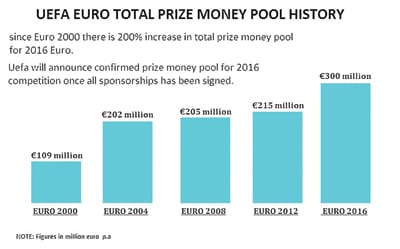Some regarded UEFA’s decision to include nearly half of its 55 members as a move to leverage football’s ability to bring people together in a celebration of sport and national identity. The more cynical argued that inflating the scope and scale of the tournament was driven more by financial motives than sporting or political ones. The steady rise from the four teams that contested the inaugural finals in 1960, through the years of eight and 16 teams to the new set-up, has meant more games and therefore more commercial activity.
Adding eight extra teams meant an additional 20 matches, not to mention eight extra sets of fans, television territories and commercial domains with a direct stake in who wins. The 2.5 million people UEFA expected to fill the 10 host stadiums, including 1.5 million foreign visitors to France, represented a predicted rise of more than a million on the 2012 tournament held jointly in Poland and Ukraine. No doubt this saw the tournament better the €1.4 billion in revenues generated the last time around.
WINNER DOES NOT TAKE ALL
The total prize money for the tournament was €301 million – representing a huge increase in the €194 million total for Euro 2012. The overall winners earned their national association a maximum of €27 million, while all participating nations earned a minimum of €8 million.
However, these payments pale in comparison to the prize money available in Europe’s top domestic leagues. For instance, Aston Villa came last in this year’s English Premier League, yet the club still pocketed more than €80 million in prize money. This year’s fairy tale winners of England’s domestic club competition, Leicester City, won in excess of €100 million.
The Premier League is a bigger beast, of course. It generates TV rights of €2.2 billion a year, whereas the rights associated with the Euro finals are estimated at around €1 billion – though the Euro finals were worth much more per game: about €20 million vs. the Premier League’s €6 million.
 To put the Premier League into context, UEFA has said that when the new TV rights deal raises the pot to around €3.3 billion a year from the 2016-17 season onwards, it will probably outstrip the media rights associated with the National Football League, the home of American football in the U.S. This is expected to help the combined financial earnings of European football overtake America’s big four: American football, basketball, ice hockey and baseball.
To put the Premier League into context, UEFA has said that when the new TV rights deal raises the pot to around €3.3 billion a year from the 2016-17 season onwards, it will probably outstrip the media rights associated with the National Football League, the home of American football in the U.S. This is expected to help the combined financial earnings of European football overtake America’s big four: American football, basketball, ice hockey and baseball.
As for other major football tournaments, the UEFA Champions League produced revenues from rights and sponsorship of €1.5 billion in 2014-15, while Brazil’s 2014 World Cup was even more lucrative, generating revenues of €3.5 billion from rights and sponsorship (plus another €465 million from ticket sales).
The total prize money for the tournament was €301 million – representing a huge increase on the €194 million total for Euro 2012. The overall winners earned their national association a maximum of €27 million, while all participating nations earned a minimum of €8 million
FIVE GOLD RINGS
Also crammed into this summer of sport will be the Olympics in Rio. It is expected that more people will watch the Olympics than the Euros, and it represents a different league of financial opportunity. Separate figures for the income of the London Olympics in 2012 are not available, but the combined income for that event and the Vancouver Winter Olympics of 2010 was €13.2 billion.
While comparing a European event for one sport and a world event for many sports is only fair up to a point, there is a marked difference in the investments in infrastructure required of host nations. France has renovated stadiums that will likely be heavily used by teams for years to come. Brazil, in contrast, is looking carefully at each and every item in an attempt to control costs. The Olympic investment budget is several times bigger than Euro 2016, coming in at around €9 billion
 The Brazilian economy was booming in 2009 when it won the right to host the Rio Olympics and politicians there would be forgiven for wondering whether “won” is the right word to use – particularly after the World Cup. As well as huge infrastructure projects, there will be anxieties over the threat of terrorist attacks and also the challenge of dealing with the Zika virus and its adverse publicity.
The Brazilian economy was booming in 2009 when it won the right to host the Rio Olympics and politicians there would be forgiven for wondering whether “won” is the right word to use – particularly after the World Cup. As well as huge infrastructure projects, there will be anxieties over the threat of terrorist attacks and also the challenge of dealing with the Zika virus and its adverse publicity.
Football has become a global sporting juggernaut in recent years. Euro 2016 may not be the largest tournament in financial terms, but it just got a lot bigger. It benefitted from the global popularity of both individual players and the club teams they normally represent. Whether the action on the pitch lived up to the hype, of course, is something that only the fans can judge.